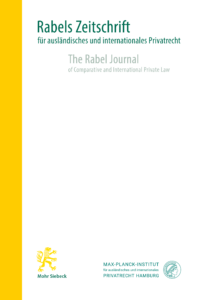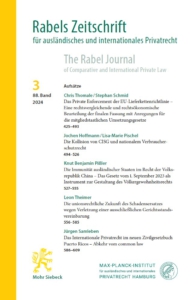RabelsZ: New issue alert
 Issue 2 of RabelsZ 89 (2025) is out. All content is Open Access: CC BY 4.0 and more articles are available Online First. The full table of contents is available here.
Issue 2 of RabelsZ 89 (2025) is out. All content is Open Access: CC BY 4.0 and more articles are available Online First. The full table of contents is available here.
 Issue 2 of RabelsZ 89 (2025) is out. All content is Open Access: CC BY 4.0 and more articles are available Online First. The full table of contents is available here.
Issue 2 of RabelsZ 89 (2025) is out. All content is Open Access: CC BY 4.0 and more articles are available Online First. The full table of contents is available here.
 The last issue of RabelsZ 2024 has just been released. It contains the following contributions (which are all available Open Access: CC BY 4.0):
The last issue of RabelsZ 2024 has just been released. It contains the following contributions (which are all available Open Access: CC BY 4.0):
Holger Fleischer & Simon Horn, Unternehmensskandale und skandalgetriebene Regulierung: Die Stavisky-Affäre als Prüfstein (Corporate Scandals and Scandal-Driven Regulation: The Stavisky Affair as Touchstone), pp. 648–693, https://doi.org/10.1628/rabelsz-2024-0062 Read more
 Issue 3 of RabelsZ 2024 has just been released. It contains the following articles:
Issue 3 of RabelsZ 2024 has just been released. It contains the following articles:
Chris Thomale and Stephan Schmid, Das Private Enforcement der EU-Lieferkettenrichtlinie – Eine rechtsvergleichende und rechtsökonomische Beurteilung der finalen Fassung mit Anregungen für die mitgliedstaatlichen Umsetzungsgesetze (Private Enforcement in the EU Supply Chain Directive: A Critical Comparative Law and Economics Analysis of the Final Compromise with Suggestions for its Implementation by the Member States), pp. 425–493, https://doi.org/10.1628/rabelsz-2024-0046 Read more
 The latest issue of RabelsZ has just been released. In addition to the following articles it contains fantastic news (mentioned in an earlier post today): Starting with this issue RabelsZ will be available open access! Enjoy reading:
The latest issue of RabelsZ has just been released. In addition to the following articles it contains fantastic news (mentioned in an earlier post today): Starting with this issue RabelsZ will be available open access! Enjoy reading:
Symeon C. Symeonides, The Torts Chapter of the Third Conflicts Restatement: An Introduction, pp. 7–59, DOI: https://doi.org/10.1628/rabelsz-2024-0001 Read more
